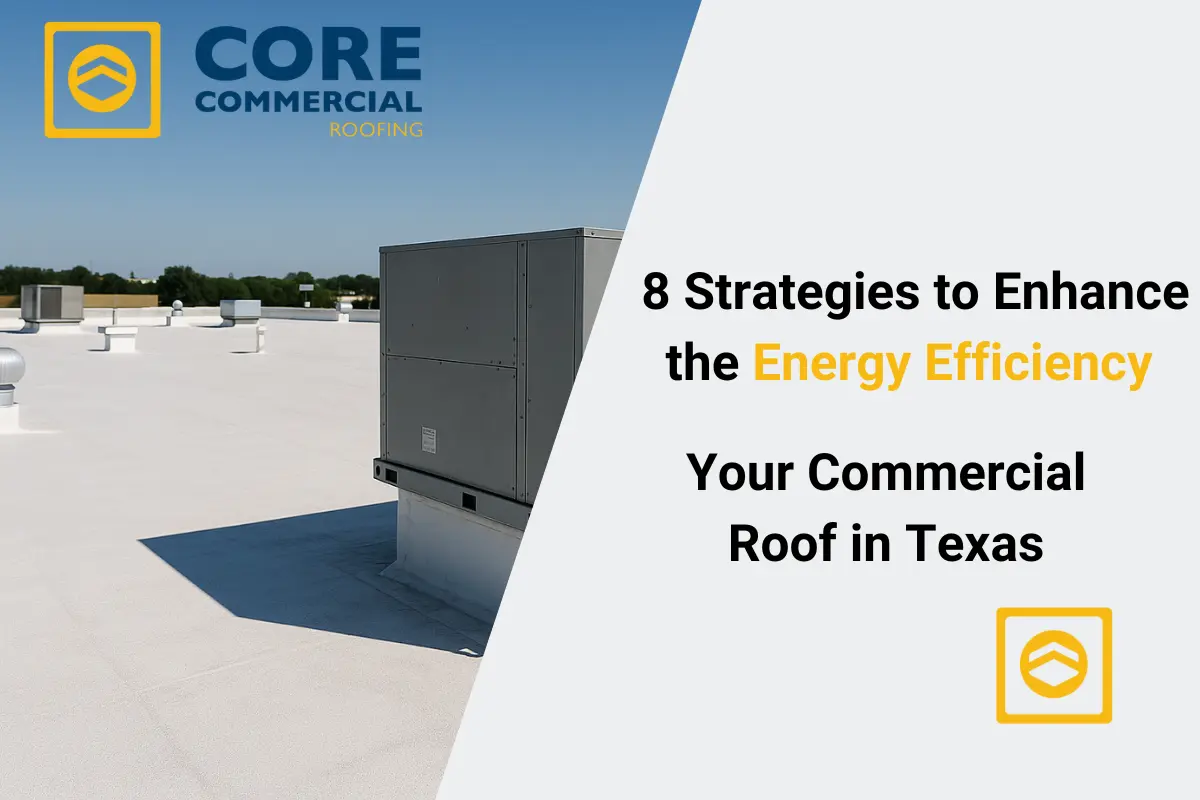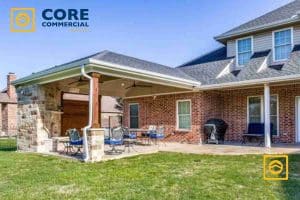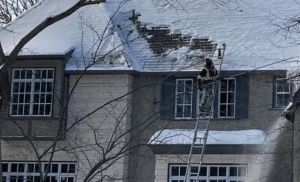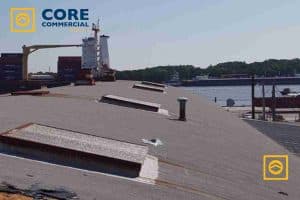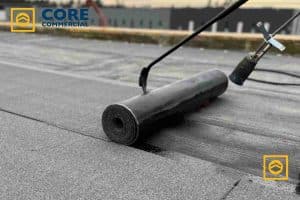In Texas, where summer temperatures often soar past 100°F, your commercial roof does more than shield against rain; it plays a major role in your building’s energy efficiency. If indoor spaces constantly battle heat, the real issue could be right above you.
Fortunately, you don’t need a full roof replacement to see real improvements. With the right upgrades, you can significantly reduce thermal load, ease HVAC strain, and lower utility costs.
This article outlines eight proven strategies to boost your commercial roof’s performance, including our favorite approaches, like reflective coatings, upgraded insulation, and strategic ventilation enhancements. Whether you manage a school, warehouse, retail space, or office complex, these solutions offer long-term savings and better indoor comfort all while extending your roof’s life.
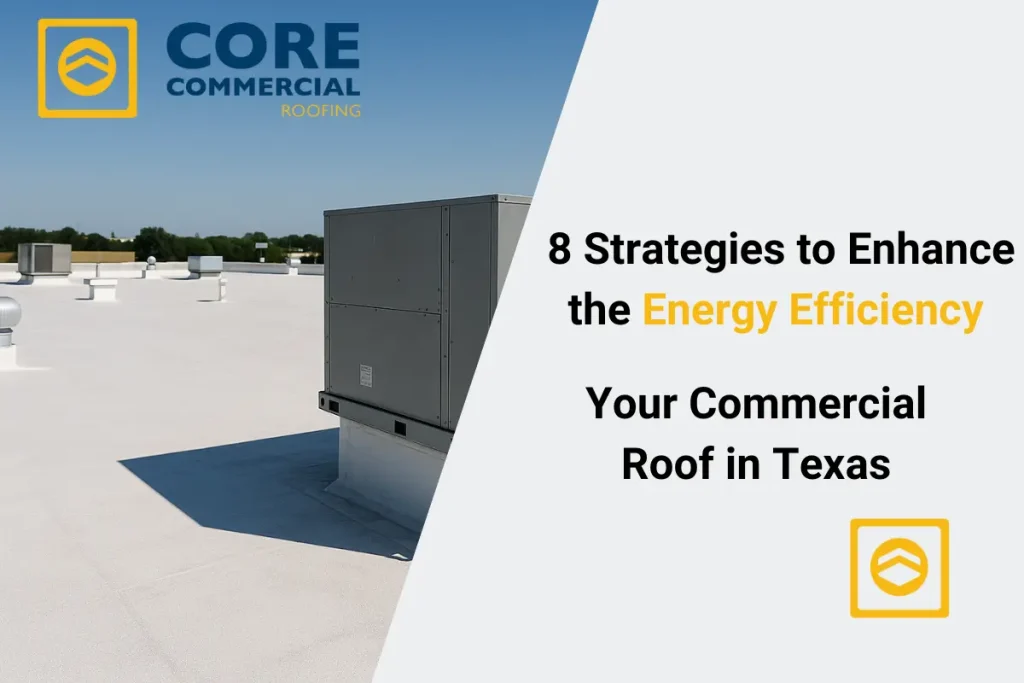
Table of Contents
1. Choose Reflective Roofing Materials (Cool Roofs)
Commercial buildings in Texas take a beating from the sun. One of the simplest yet most effective ways to improve energy efficiency is by switching to a cool roof system. These materials reflect more sunlight and absorb less heat than traditional roofing, keeping your building cooler and reducing reliance on air conditioning.
Benefits:
- Decreased indoor temperatures
- Lower summer energy bills
- Reduced urban heat island effect
- Extended roof lifespan due to less heat-related stress
Popular materials in Texas:
- White TPO (Thermoplastic Polyolefin) membranes
- Reflective metal roofs with cool coatings
- Elastomeric coatings applied over existing roofs
2. Insulate Properly to Prevent Heat Transfer
Insulation is your first line of defense against energy loss. In Texas, where temperature swings can be significant between day and night, high-quality insulation under your roof deck helps regulate internal temperatures year-round.
Focus areas for insulation:
- Flat commercial roofs with open ceilings
- Roof decks, especially in metal buildings
- Retrofit options for existing roofs
Pro tip: Use rigid foam boards or spray foam insulation that performs well in both hot and cool climates.
Energy savings payoff: Proper insulation can reduce HVAC energy use by up to 30%.
3. Install a Radiant Barrier
Texas sun is relentless, and a radiant barrier reflects radiant heat instead of absorbing it into your building. This thin metallic material is installed under the roof and is particularly effective in large warehouses, retail centers, or office buildings with open ceilings.
Why radiant barriers work:
- Reflect 90 %+ of radiant heat
- Keep attics or upper floors significantly cooler
- Reduce HVAC runtime
Radiant barriers are low-maintenance and can be combined with insulation for maximum energy control.
4. Regularly Maintain and Seal Your Roof
Even the most energy-efficient roof will fail if it’s not properly maintained. Leaks, cracks, and worn seals allow heat and moisture to enter, leading to energy waste and potential interior damage.
Key maintenance tasks:
- Inspect seams and flashing for damage
- Clean debris that blocks drainage and traps heat
- Apply reflective sealants where needed
- Check for ponding water that increases heat absorption
Texas tip: Schedule biannual inspections—before the peak of summer and after storm season.
5. Upgrade to a Green Roofing System
If your business is ready to go the extra mile, a green or vegetative roof offers unmatched energy efficiency and environmental benefits. By covering your commercial roof with soil and plants, you create a natural barrier against heat.
Benefits of the Texas climate:
- Absorbs less solar radiation than standard roofs
- Adds insulation during extreme heat
- Reduces runoff during heavy rains
Ideal for: Urban buildings, retail centers, schools, and eco-conscious brands looking to lead in sustainability.
6. Improve Roof Ventilation
Efficient ventilation helps heat escape rather than getting trapped under the roof, especially in Texas’s long summer months. Without it, hot air builds up and heats your building from the top down.
Effective ventilation options:
- Ridge vents
- Powered exhaust fans
- Soffit vents combined with turbines
Energy impact: Proper ventilation can reduce attic temperatures by 20°F or more, which dramatically cuts cooling costs.
7. Use Roof Coatings for Reflectivity and Protection
A high-quality reflective roof coating not only extends the life of your existing roof but also significantly improves its thermal performance. These coatings reflect sunlight and prevent UV damage.
Types of coatings suitable for Texas roofs:
- Acrylic-based coatings for UV protection
- Silicone coatings for waterproofing and durability
- Reflective aluminum or white coatings for maximum solar reflectance
Why this matters: Applying a coating can increase a roof’s reflectivity by over 60%, translating to measurable energy savings and longer roof performance.
8. Conduct a Professional Energy Audit of Your Roof
You can’t improve what you don’t measure. A professional energy audit pinpoints exactly how your commercial roof is performing and where it’s losing energy.
What an audit can reveal:
- Insulation gaps
- Air leaks
- Underperforming materials
- Cost-effective upgrade opportunities
Texas-specific bonus: Many energy audit providers offer rebate programs or work with utility companies to reduce the cost of implementation.
Tip: Schedule audits every few years, especially after a major storm or when energy bills suddenly spike.
Final Thoughts: Smart Roofing Moves Equal Big Texas Savings
In the heat-heavy landscape of Texas, where cooling costs often dominate operational expenses, investing in roof energy efficiency isn’t optional—it’s a strategic business decision. From cool roofs to green systems, from radiant barriers to simple coatings, each of these eight strategies offers tangible benefits: lower utility bills, longer roof life, and a more comfortable environment for employees and customers.
Start with what’s feasible, like a reflective coating or improved insulation, and build from there. The return on investment is clear: enhanced comfort, reduced energy bills, and stronger building performance. And in a state like Texas, where the weather doesn’t hold back, your roof shouldn’t either.
FAQs
What are the benefits of cool roofs for Texas commercial buildings?
Cool roofs reflect more sunlight and absorb less heat than standard roofs. In Texas’s hot climate, this can lead to significant energy savings by reducing the need for air conditioning, lowering indoor temperatures, and extending the lifespan of the roof.
How does roof insulation improve energy efficiency in Texas buildings?
Proper roof insulation acts as a barrier to heat flow, keeping buildings cooler in the summer and warmer in the winter. In Texas, where temperatures can be extreme, effective insulation reduces the workload on HVAC systems, leading to lower energy bills and improved indoor comfort.
What is a radiant barrier, and is it effective in Texas?
A radiant barrier is a reflective material installed in attics or under roofs to reduce heat gain by reflecting radiant heat away. In Texas’s sunny climate, radiant barriers can significantly decrease cooling costs by keeping buildings cooler, especially during peak summer months.
Are green roofs suitable for commercial buildings in Texas?
Yes, green roofs, which are covered with vegetation, provide natural insulation and reduce heat absorption. In Texas, they help lower indoor temperatures, manage stormwater, and improve air quality, making them a sustainable option for commercial buildings.
How many times a year should I check my commercial roof in Texas?
It’s recommended to inspect commercial roofs at least twice a year, preferably in the spring and fall. Regular inspections help identify and address issues like leaks, cracks, or insulation problems early, ensuring the roof remains energy-efficient and prolonging its lifespan.
What are the advantages of roof coatings for energy efficiency?
Roof coatings, such as reflective or cool roof coatings, can enhance a roof’s ability to reflect sunlight, reducing heat absorption. In Texas, applying these coatings can lower roof temperatures, decrease cooling costs, and extend the roof’s service life.
Can upgrading my commercial roof qualify for energy rebates in Texas?
Yes, Texas offers various incentive programs and tax breaks for businesses that implement energy-efficient improvements, including roofing upgrades. These incentives can help offset the initial costs and provide long-term savings.
What roofing materials are best for energy efficiency in Texas?
Materials like TPO (Thermoplastic Olefin), reflective metal roofing, and PVC are known for their energy-efficient properties. They reflect sunlight effectively, resist UV damage, and are durable, making them suitable for Texas’s climate.
How does roof ventilation impact energy use in commercial buildings?
Proper roof ventilation allows hot air to escape, reducing indoor temperatures and the load on cooling systems. In Texas, effective ventilation is crucial for maintaining energy efficiency and preventing moisture-related issues.
What is the role of an energy audit for my commercial roof?
An energy audit assesses your building’s energy use and identifies areas where efficiency can be improved. For commercial roofs in Texas, audits can pinpoint insulation deficiencies, air leaks, or other issues, guiding targeted upgrades that enhance energy performance and reduce costs.

